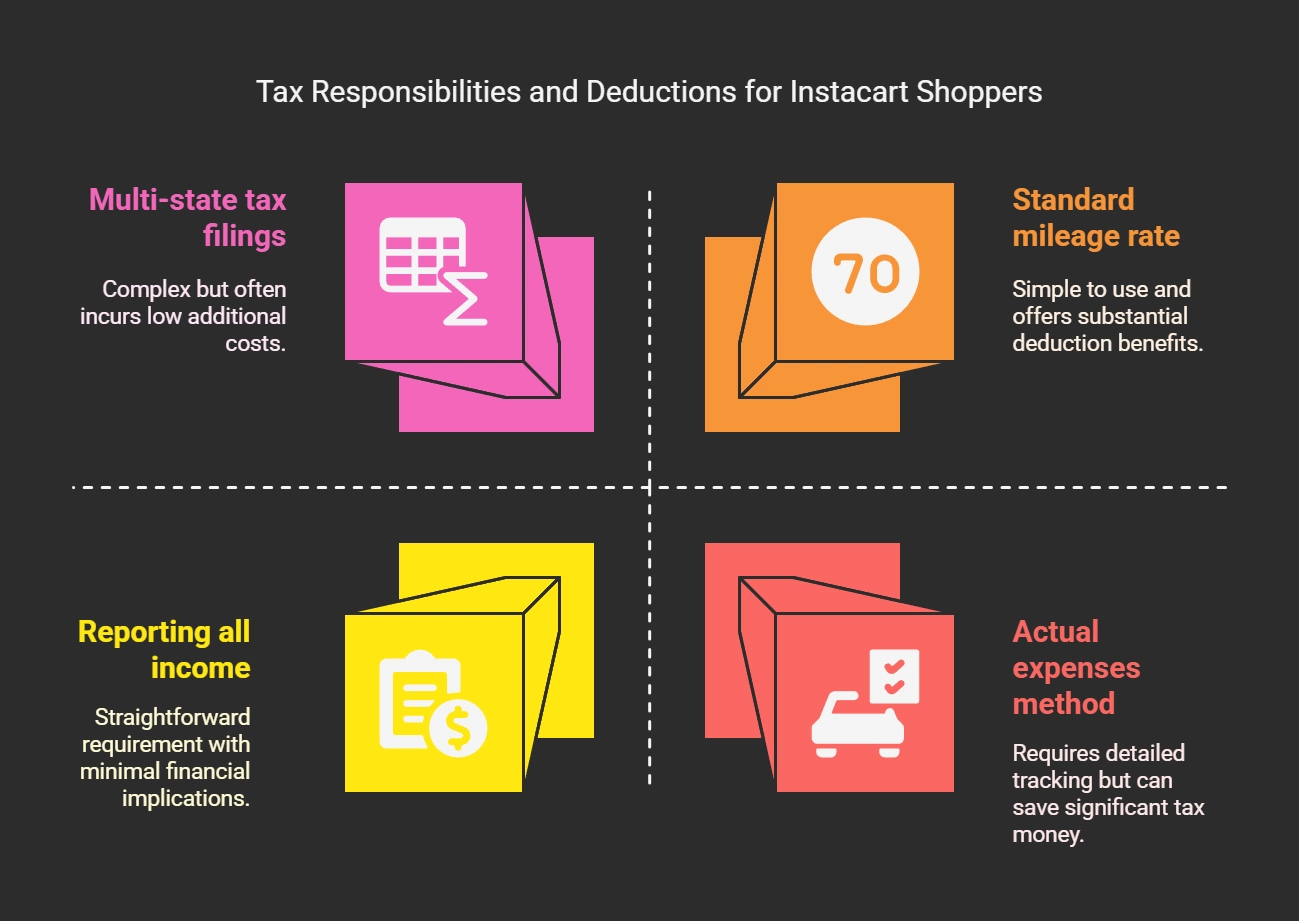Last Updated: January 6, 2025
Navigating the complex terrain of self-employed tax write-offs can feel like a daunting task for many independent professionals.
From understanding the nuances of tax-deductible items for self-employed individuals to maximizing your self-employed tax deductible expenses, the art of managing your finances smartly depends on leveraging every deduction of self-employment tax to your advantage.
Whether you’re a freelancer on a 1099, a sole proprietor, a small business owner, or an independent contractor, knowing the ins and outs of self-employment tax deductions is crucial to optimizing your earnings.
For those operating under 1099, the landscape of deductions for 1099 and tax write offs for self-employment offers a plethora of opportunities to reduce your taxable income.
Similarly, understanding self-business tax deductions and deductions for self-employment taxes can significantly impact your financial health.
Tax write offs for the self-employed, tax deductions for independent contractors, sole proprietor tax deductions, and sole proprietorship tax write offs are essential elements that require your attention.

Understanding Tax Deductions: The Basics for Self-Employed Professionals
Navigating the world of tax deductions doesn’t have to feel like deciphering an ancient code. For the self-employed maestros out there turning passions into paychecks, understanding tax write-offs can be your golden ticket to significant savings. Let’s break it down into bite-sized pieces, shall we?
What Qualifies as a Tax Deduction for Self-Employed Individuals?
First off, a tax deduction is essentially a reduction in the income you’re taxed on, which can lower your tax bill. For the self-employed, these deductions span a wide array of expenses incurred in the pursuit of business glory. This includes, but is not limited to:
- Home office expenses (if your home office is the principal place of your business)
- Supplies and equipment necessary for your work
- Travel and mileage expenses related to business
- Internet and phone fees
- Advertising and marketing costs
- Legal and professional fees
Standard vs. Itemized Deductions: What’s the Deal?
When filing your taxes, you have the option to take the standard deduction or itemize your deductions. The standard deduction is a flat amount the IRS allows you to deduct from your income, no questions asked. On the flip side, itemized deductions require you to list each deductible expense individually. For self-employed individuals, itemizing can often lead to larger deductions because it includes specific business-related expenses.
FAQs to Guide You Through
- Q: How do I know if an expense is deductible?
A: Ask yourself, “Is this expense both ordinary and necessary for my business?” If yes, it’s likely deductible. Keep in mind, personal expenses are off the table. - Q: Can I deduct home office expenses if I work from a corner of my bedroom?
A: The IRS is pretty strict about the home office deduction. The space must be used regularly and exclusively for business to qualify. - Q: What records do I need to keep for my deductions?
A: Keep detailed records of all business-related expenses, including receipts, bills, and mileage logs. Digital records are fine, but ensure they’re organized and easily accessible.
Home Office Deductions: Maximizing Your Work-from-Home Expenses
The shift to remote work has made the home office an integral part of many self-employed professionals’ lives. But did you know that your makeshift workspace could be a goldmine for tax savings? Let’s dive into how you can transform your work-from-home setup into a hub for home office deductions.
Eligibility Criteria for Claiming Home Office Deductions
First things first, not every corner of your home used for work qualifies for a deduction. The IRS lays out specific criteria for this:
- Regular and Exclusive Use: Your home office must be used regularly for business activities and exclusively for the purpose of your work. That means, if your office doubles as a guest room, it might not qualify.
- Principal Place of Your Business: This space must be the main place where you conduct your business. If you meet clients elsewhere but manage the bulk of your operations from your home office, you’re in the clear.
What Expenses Can Be Deducted?
Transforming your space into a productivity haven involves various costs, many of which can lighten your tax load. These include:
- Direct Expenses: Costs directly related to your home office, like repairs or painting, are fully deductible.
- Indirect Expenses: These are costs for maintaining your entire home but can be partially deducted based on the percentage of your home used for business. Think utilities, internet, and mortgage interest or rent.
Calculating Your Deduction: The Simplified vs. Regular Method
- Simplified Method: Offers a standard deduction of $5 per square foot of your home used for business, up to 300 square feet.
- Regular Method: Requires calculating the actual expenses of your home office based on its percentage of your total home space.
FAQs to Navigate Home Office Deductions Smoothly
- Q: Can I claim the home office deduction if I rent my home?
A: Absolutely! Renters and homeowners alike can benefit from this deduction, provided they meet the eligibility criteria. - Q: What if I use part of my home for business occasionally?
A: The key word is “exclusive.” Occasional or dual-purpose use doesn’t qualify. Your home office must be dedicated solely to your business activities. - Q: How do I prove my home office use to the IRS?
A: Keep a log of the hours you work from your home office and take photos. Retain all receipts related to home office expenses as well.
Travel and Transportation: Navigating Write-Offs for On-the-Go Professionals
For self contractors and independent contractors, understanding and maximizing tax deductions is crucial to lowering your taxable income and enhancing your financial well-being. One area that often raises questions is the deduction of vehicle expenses, particularly when it comes to commuting miles taxes and the IRS tax mileage rate for 2024. Let’s navigate these waters together, highlighting the best strategies and tools to ensure you’re making the most of your deductions.
Understanding the IRS Tax Mileage Rate 2024
The IRS tax mileage rate for 2024 serves as a benchmark for self contractors and independent contractors to calculate their vehicle expenses for business-related travel. This rate covers not just the gas but also the wear and tear on your vehicle, including oil changes and depreciation. It’s a comprehensive figure that simplifies claiming tax deductions for an independent contractor.
Mileage vs. Gas: Which to Claim?
A common query among self-employed individuals is whether it’s better to claim mileage or gas on taxes. Generally, claiming the standard mileage deduction is more beneficial because it tends to provide a larger deduction than itemizing all vehicle-related expenses like gas, repairs, and maintenance. This includes asking, “Can you write off oil changes?” While specific expenses like oil changes are deductible if you choose to itemize, the simplicity and often greater return make the standard mileage rate the preferred method for many.
Best Mileage Tracker App for Taxes
Given the importance of accurate record-keeping for tax write-offs for the self-employed, leveraging technology can be a game-changer. The best mileage tracker app for taxes can make tracking every business-related mile effortless. While there are many options available, features to look for in the best free mileage tracker app for taxes include automatic tracking, easy categorization of trips, and comprehensive reporting capabilities so that the logs created will stand up against an IRS audit.
For self contractors and those seeking tax deductions as an independent contractor, understanding how to accurately track and claim deductions for business-related mileage is paramount.
The best mileage tracker for taxes not only simplifies the process of recording every business mile but also ensures that you are maximizing your self contractor tax deductions with precision and compliance.
These apps not only serve as your digital logbook but also act as a crucial ally in the quest to harness all eligible tax advantages. By accurately capturing every mile driven for business purposes, independent contractors can substantiate their deductions, ultimately enhancing their financial outcomes through smart tax strategies.
What Travel Expenses Can You Deduct?
Hitting the road for business comes with its costs, but many are tax-deductible. Here’s what you can include:
- Transportation: Plane, train, and automobile expenses that are business-related can be deducted. This includes fares for flights, taxis, and even parking and toll fees.
- Lodging: Hotel stays for business trips are deductible, but there’s a catch – it must be necessary and not extravagant.
- Meals: Meals on business trips can be deducted, but typically only 50% of the meal costs are eligible.
- Mileage: Driving to meet clients? The standard mileage rate deduction allows you to deduct a set amount per business mile driven.
FAQs for Smooth Sailing on Mileage Deductions
- Q: Can I deduct travel expenses for a trip that combines business with pleasure?
A: Yes, but only the portion of the trip directly related to business activities is deductible. Keep detailed records to separate business from pleasure expenses. - Q: How do I track mileage for business trips?
A: Use a mileage log or a mobile app to record dates, mileage, and the purpose of each trip. Accuracy is key to ensuring these deductions stand up to scrutiny. - Q: What about commuting expenses?
A: Unfortunately, the costs of commuting from your home to your primary place of business are not deductible. However, travel from your office to meet a client or to a secondary business location is deductible. - Q: How many miles can you write off on taxes?
A: You can write off any miles driven for business purposes on your taxes. - Q: Is it better to write off mileage or gas?
A: For most, writing off mileage provides a greater deduction than itemizing vehicle expenses like gas, especially when using the IRS standard mileage rate. - Q: Can I claim commuting miles on my taxes?
A: Commuting miles—the distance between your home and your regular place of business—are generally not deductible. However, trips from your office to meet clients or travel between job sites are deductible. - Q: How do I ensure my mileage deductions are audit-proof?
A: Keep detailed records of your business travel, including dates, miles, and purposes of each trip. Using one of the best mileage tracker apps for taxes, such as Mileage, can automate this process and ensure IRS-Proof accuracy. - Q: Can I recover past mileage logs retrospectively?
A: Yes, MileageWise offers such advanced options via its Google Timeline Importer and AI Wizard solutions.
Maximizing Your Travel Deductions
To make the most of these deductions, organization and documentation are your best friends. Keep a detailed log of all travel expenses, including dates, destinations, and the business purpose of each trip. Receipts are essential for lodging and meals, while a mileage log supports your vehicle expenses deduction.
Download MileageWise’s automatic mileage tracker app from Google Play or the App Store & try it for free for 14 days. No credit card required!
Internet and Phone Expenses: Staying Connected, Staying Deductible

In today’s digital age, staying connected is not just a convenience—it’s a necessity for self-employed professionals. The internet and phone aren’t just tools for keeping in touch with clients and conducting business; they’re also potential tax deductions that can significantly lower your taxable income. Let’s explore how you can smartly deduct these essential services.
Understanding What’s Deductible
Virtually every self-employed professional relies on the internet and a phone to operate their business. Thankfully, the IRS recognizes these costs as legitimate business expenses. Here’s what you need to know:
- Deduction Eligibility: The portion of your internet and phone bills used for business purposes can be deducted. This includes data plans, monthly service charges, and even specific business-related apps or software subscriptions.
- Home Office Connection: If you have a home office, the process simplifies. You can partially claim internet tax deductions as part of your home office expenses. The key is determining what percentage of internet use is for business.
- Separating Personal and Business Use: For both internet and phone expenses, the crucial factor is the business-use percentage. Personal use is not deductible, so maintaining clear separation is vital.
FAQs to Navigate Your Deductions
- Q: How do I calculate the business portion of my internet and phone bills?
A: Review your usage patterns over a typical month. If, say, 60% of your data and call time are for business, then that percentage of your bill becomes deductible. - Q: Can I deduct the full cost of my smartphone or computer if I use it for business?
A: If you use your device exclusively for business, yes. However, if it’s for both personal and business use, you’ll need to calculate the deductible portion based on business use. - Q: What if I have a separate business phone line or internet connection?
A: Separate business lines or connections are 100% deductible. This is often the simplest way to manage deductions and maintain clear records for the IRS. - Q: What does it mean to write off a car?
A: Writing off a car means claiming the expenses related to a car as a tax deduction. This is generally applicable when the vehicle is used for business purposes and can include depreciation and other operating expenses. - Q: Can I write off car lease payments for business?
A: Yes, car lease payments can be written off as a business expense on your taxes, provided the vehicle is used primarily for business purposes. The deduction will usually cover the portion of the lease equivalent to the percentage of business use. - Q: How do I write off a truck for business?
A: To write off a truck for business, you need to use the truck primarily for business activities. You can deduct expenses such as the cost of the truck, maintenance, and operational costs proportionate to its business use. Using the standard mileage rate or actual expenses method can account for these costs. - Q: Is health insurance a business expense?
A: For self-employed individuals, health insurance premiums can indeed be deducted as a business expense, directly reducing your taxable income. This is applicable if you are not eligible to participate in a health plan through your spouse’s employer. - Q: Is gas a business expense?
A: Yes, gas can be a deductible business expense when the vehicle is used for business purposes. You can choose to deduct actual expenses for gas and maintenance or opt for the standard mileage rate, which includes gas costs.
Maximizing Your Deductions
- Keep Detailed Records: Document your internet and phone usage, highlighting business activities. This can include logs of business calls, data usage reports, and receipts for any business-specific services.
- Review Plans Regularly: Ensure your internet and phone plans are cost-effective and meet your business needs. Overpaying for services you don’t use can eat into your profits.
- Consider Separate Business Contracts: Having dedicated internet and phone services for your business simplifies deductions and strengthens your case in the event of an audit.
Audit-Proofing Your Deductions: Best Practices for Self-Employed
Facing an IRS audit can be a daunting prospect for any self-employed professional. However, with the right preparation and documentation, you can make your tax deductions virtually audit-proof. Let’s walk through some essential tips and strategies to keep your deductions clear, organized, and defensible.
Maintain Impeccable Records
The cornerstone of audit-proofing your deductions is meticulous record-keeping. This means:
- Receipts: Keep all receipts related to business expenses, no matter how small. Digital copies are acceptable, but ensure they are clear and legible.
- Mileage Logs: For vehicle deductions, maintain detailed logs that include dates, mileage, purposes of the trips, and destinations as per the relevant IRS-requirements.
- Bank Statements and Invoices: These documents can corroborate your receipts and show a clear trail of your business expenses.
Separate Personal and Business Finances
Mixing personal and business finances is a red flag for auditors. To avoid confusion:
- Use Separate Bank Accounts: Have one bank account for business income and expenses and another for personal transactions.
- Dedicated Credit Cards: Use a business credit card for all business-related purchases to simplify tracking and record-keeping.
Understand Your Deductions
Being knowledgeable about what you can and cannot deduct is crucial. Common areas of confusion include:
- Home Office Deductions: Understand the strict criteria for this deduction, such as exclusive and regular use of the space for business.
- Meal and Entertainment Expenses: Know the limitations and requirements, like the 50% deduction rule for business meals.
FAQs to Guide You Through Tax Deductions
- Q: How long should I keep my tax records and receipts?
A: The IRS recommends keeping records for up to seven years. Some documents may need to be retained longer, depending on the situation. - Q: What’s the best way to organize my tax documents?
A: Organize them by year and category (e.g., income, expenses, home office). Digital organization with cloud storage or tax software can also be incredibly efficient. - Q: Can I still claim a deduction if I lose a receipt?
A: Yes, but you’ll need to provide other documentation to support the expense, such as bank or credit card statements. - Q: Should I use a tracker app for gas mileage?
A: Yes, but you may need a little bit more than that. A full features mileage tracker app that generates IRS-Proof mileage logs would greatly benefit you long term.
Regularly Review Tax Laws and Updates
Tax laws change, and staying informed can help you maximize deductions and avoid mistakes. Consider consulting with a tax professional annually to ensure your understanding is up-to-date.
Consult with a Tax Professional
Even with the best preparation, the complexity of tax laws can make it challenging to navigate deductions confidently. A tax professional can offer:
- Personalized Advice: Tailored strategies to maximize your deductions legally.
- Audit Support: Assistance and representation if you are audited.
Wrapping It Up
In conclusion, navigating the landscape of tax deductions as a self-employed professional or independent contractor can significantly impact your financial health, turning potential tax burdens into opportunities for savings. By understanding the intricacies of home office deductions, maximizing travel and transportation write-offs, and making informed choices between mileage versus gas deductions, you can ensure you’re not leaving money on the table.
Leveraging technology with the best mileage tracker apps further streamlines this process, making tax preparation less daunting and more efficient. Armed with the knowledge of IRS guidelines and equipped with the right tools, you can confidently approach tax season, ready to claim every deduction you’re entitled to and optimize your tax return.
| MileageWise | Other Mileage Tracker Apps | Other GPS Based Trackers | Excel | Tax Professional | |
| Mobile App for Ongoing Tracking | |||||
| Web Dashboard to Manage Trips | |||||
| Imports Trips and Locations from Google Timeline | |||||
| Lifetime Deals Available | |||||
| Average Reported Business Mileage Deduction | $12,000 | $710-$8500 | $400-$5,700 | $200-$2,000 | |
| Average Time Creating Retrospective Mileage Log (Yearly) | 7 minutes | 180 minutes | 180 minutes | 180 minutes | N/A |
| AI Wizard Mileage Log Generator for Retroactive Mileage Recovery | |||||
| Produces IRS-Proof Mileage Logs | |||||
| Free Phone Support with Live Agent | |||||
| Mileage Log Preparation Service | |||||
| Data Accessible in the Cloud |







